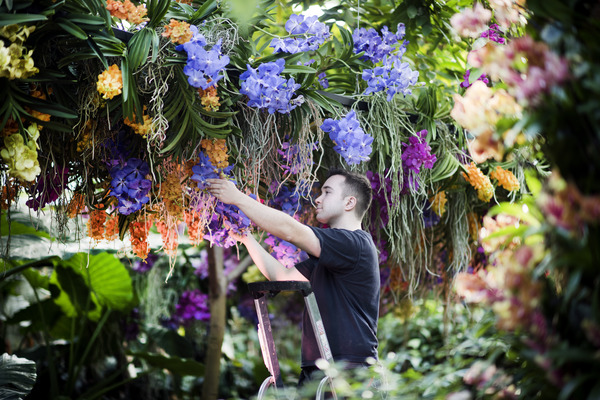Taking inspiration from the beauty and biodiversity of Cameroon, Orchids 2023 is a vibrant celebration of colour to brighten up the winter months, and is the first time Kew’s Orchid festival will celebrate an African nation.

Orchid festival, Jeff Eden © RBG Kew
Back bigger and better than ever for 2023, Kew Gardens’ much-loved Orchid festival returns to the Princess of Wales Conservatory from Saturday 4 February to Sunday 5 March 2023. Encompassing a series of stunning horticultural displays and living sculptures, the festival takes places across the ten different climatic zones which make up Kew’s state-of-the-art Princess of Wales Conservatory, replicating a series of fascinating global ecosystems under one roof.
Stunning displays
Orchids 2023 will highlight the varied landscapes and native wildlife of Cameroon, with larger-than-life sculptures hand-crafted by a team of expert horticulturists from real plants, including an amazing array of colourful orchids. Visitors can encounter towering giraffe sculptures and a troop of gorillas, alongside magnificent roaring lions and wallowing hippo arrangements, highlighting the incredible biodiversity and awe-inspiring wildlife of this West African nation.
Bikoka Art Project Exhibition
As part of the festival, art critic and historian Christine Eyene will also curate a photography exhibition from the Bikoka Art Project, a new independent initiative dedicated to providing artistic and professional opportunities to local youth and women, and supporting the next generation of creatives in Lolodorf, Cameroon. Showcasing the work of photographer Yvon Ngassam, the exhibition will span the North End of the Princess of Wales Conservatory, capturing everyday scenes and spectacular landscapes from Lolodorf and beyond. Alongside this, Eyene will curate a unique soundscape for the festival, collaborating with musician and sound artist Elsa M’bala to create an evocative, immersive experience for visitors.
Orchids After Hours will also return, programmed by Marie-Solange Ndeley, alongside food and drink from Carine Ottou, founder of Inspiring Chefs, who will also taking over Kew’s cafes and restaurants with a selection of new dishes.
Solene Dequiret, Supervisor of the Princess of Wales Conservatory at the Royal Botanic Gardens, Kew adds: “We always look forward to the return of the Orchid festival and this year we are excited to welcome visitors to enjoy a host of stunning displays inspired by the wonderful flora and fauna of Cameroon. The Orchid festival is always the perfect antidote to the chillier days of winter and provides us with a wonderful opportunity to showcase a selection of incredible plants which transform the Princess of Wales Conservatory, as well as allowing us to highlight the vital work of our science colleagues and partners working in Cameroon, alongside some incredible visual art.”
RBG Kew and Cameroon
RBG Kew works with partners across Cameroon on several vital scientific and research projects, including collaborating with the National Herbarium of Cameroon and others to identify Tropical Important Plant Areas (TIPAs) in the country. This assessment offers a practical, rigorous means of identifying priority areas for site-based conservation and ensuring the long-term survival of Cameroon’s endemic, threatened and socio-economically important plant species. Recent fieldwork has focussed on Central, South and Littoral Regions and has been combined with collecting seed of threatened tree species.
Since 2004, scientists at Kew have also been working with partners to document the biodiversity of Cameroon’s Ebo Forest with a view to designating the area as a Important Plant Areas. The Ebo Forest, one of the largest intact rainforests in Cameroon, is home to an incredible array of wildlife, including the only population of chimpanzee species that use twigs to fish out termites, and stones to crack open nuts. Researchers have also uncovered an incredible diversity of plant life in Ebo forest. By 2020, 14 plant species new-to-science have been discovered in Ebo (with more yet to be named) and over 75 threatened species of plants have been recorded there. Threatened species from this area include several plants known only from Ebo forest, such as Inversodicraea ebo, found on rocks within river rapids, and Kupeantha ebo, a small tree related to coffee.
The Royal Botanic Gardens, Kew, are dedicated to harnessing the power of plants and fungi to end the extinction crisis and secure a future for all life on Earth. With Kew’s world-leading research, global partnerships and beloved gardens – home to the world’s most diverse collections of plants and fungi – they are using their trusted voice to shape policy and practice worldwide. As a charity they rely on the critical support of visitors, not only to sustain the gardens, but to protect global plant and fungal biodiversity for the benefit of our planet and humanity.
For more information, please visit The Royal Botanic Gardens, Kew.



